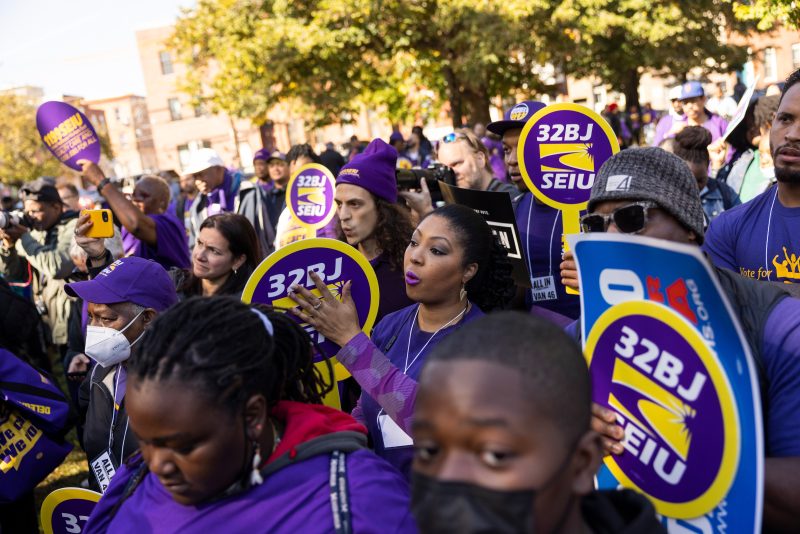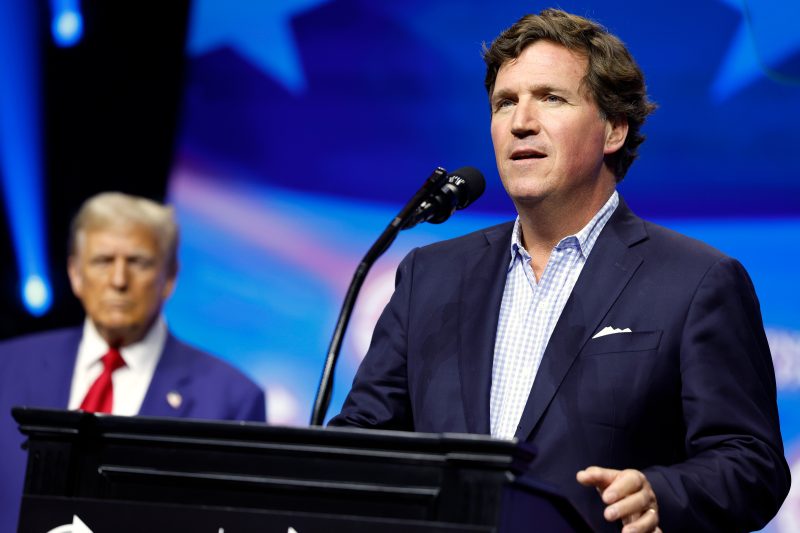
Union to spend $200 million to get working-class voters to back Biden, Democrats
The Service Employees International Union, which represents about 2 million health-care, property service and government workers, plans to spend $200 million to boost President Biden and Democrats in electoral battlegrounds across the country this year, officials at the group told The Washington Post.
The union is making its largest investment ever — after spending roughly $150 million in the 2020 presidential cycle — as it aims to reach 6 million voters of color and, more broadly, turn out working-class voters who are less likely to vote or have never voted, according to SEIU’s leaders. The significant spending plan in part reflects growing concern in Democratic circles about Biden’s ability to turn out working-class Black, Latino and Asian American voters — who made up a significant chunk of his base in 2020 — for the presidential election.
Democrats have long held a strong edge with working-class voters of color who do not have college degrees, but recent polls have shown an erosion of such support for Biden. Over a quarter (27 percent) of the union’s members are Latino, 24 percent are Black, 9 percent identify as Asian American and Pacific islander, and 40 percent are White, the group said.
Leaders from SEIU, which endorsed Biden’s reelection bid last year, said they plan to aggressively highlight to voters the stark difference between Biden and former president Donald Trump on both rhetoric and policy.
“The reality is that so much is at stake for working people, and we will put our money where our mouths are,” said April Verrett, SEIU’s secretary-treasurer, who is running to be the union’s president when longtime leader Mary Kay Henry steps down in May.
“If you look at their records, if you look at what they stand for, it is really clear. You’ve got night and day candidates,” she added.
The union said it will focus on turning out infrequent voters in Pennsylvania, Michigan, Wisconsin, Nevada, Arizona and Georgia — all states where Biden defeated Trump — as well as North Carolina, where Trump won in 2020 and where a competitive gubernatorial race is underway. It also plans to spend in California and New York, where the SEIU has a strong membership presence and several key U.S. House races will be decided. It will also invest in Ohio and Montana, where there are competitive Senate races.
The money will go toward an expansive field program, grass-roots organizing, advertising and partnering with community groups in those states. Rocio Sáenz, SEIU’s executive vice president, said the union and its allied groups have already knocked on almost 900,000 doors as part of the program, which will include outreach in seven languages.
Verrett said SEIU hopes to build off momentum from worker strikes and union organizing in the last year and sees it as the union’s role to “connect the dots” and educate voters about Biden’s record on issues such as the economy, labor and health care.
Verrett said the union is also aiming for down-ballot wins.
A recent New York Times-Siena College poll showed a dramatic shift among non-White voters without a bachelor’s degree — often shorthanded in political circles as working-class voters of color. In 2020 exit polls, this group favored Biden by 46 percentage points, but the NYT-Siena poll this month found Biden’s margin at six points, with 47 percent supporting him and 41 percent backing Trump.
“More and more, people of color are going to be where the power lies — and so that’s why it’s important to engage them now, get them to be participants in our democracy now while there’s still a democracy for them to participate in,” said Verrett.
Some working-class voters have expressed deep frustration with Biden over the economy as they have faced hardship with rising prices in recent years and high interest rates. In interviews with voters in battleground states, some question what exactly Biden has done in his first term and feel he hasn’t delivered on certain promises he made on issues, such as voting rights and immigration.
The union has held roundtables across the country to hear how voters are feeling. One of the key takeaways, the group said, is that many people don’t know all the things that Biden has done during his time in office. That’s why they’re making it a priority to educate voters on Biden’s work to lower prescription drug prices and offer subsidies for affordable internet and his long-standing support for labor unions.
Democratic strategists have said it will take aggressive spending and a strong messaging campaign to help Biden perform well with working-class voters of color in November.
“There is a political party that has brought jobs back from overseas and has created jobs in manufacturing and in construction — and that’s the Democratic Party. If we tell that story to working-class Latinos, Black people and AAPI people, we will turn them out,” said Kristian Ramos, a longtime Democratic strategist and founder of Autonomy Strategies. “So, it’s desperately needed in the 2024 conversation.”
Biden continues to struggle with White voters without college degrees, who favored Trump by 33 percentage points, 62 percent to 29 percent, in the NYT-Siena poll.



